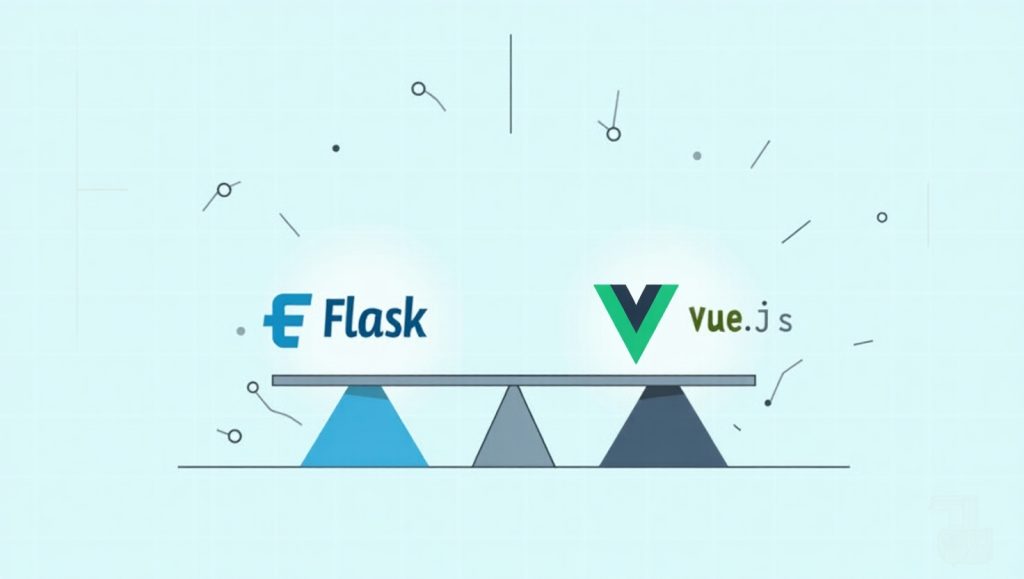
The Rise of Lightweight Frameworks
In a constantly evolving web world, the right tools make all the difference in building modern applications that are both scalable and maintainable. Developers are more frequently turning to lightweight frameworks like Flask and Vue.js – rather than traditional monolithic frameworks like Django or Angular. A need for independence, quickness, and ease of use are pushing developers towards these solutions especially in small- to medium-sized projects or Agile development startups. But what sets Flask and Vue.js apart?
Flask is a micro web framework for Python, and is centered around minimalism and flexibility. The emphasis on flexibility is why Flask has no built-in features because Flask is developed so developers can use as few or as many components as they want. Vue.js is a progressive Javascript framework that focuses on creating great user interfaces (UIs). Vue.js has great usability, with one of the best (and shortest) learning curves compared to the other frameworks we have discussed. Vue.js also has a modular architecture.
Utilizing Flask and Vue.js together is advantageous, as Flask controls the backend logic of your application, while Vue.js manages the user interface (UI) on the frontend. With Flask and Vue.js, you have a lightweight, performant, and highly customizable web stack for rapid development and use. With a static templating engine at the core, these types of projects bring developers back to more control and speed while reducing heavy abstraction. You can read more in our post on the benefits of a custom-built platform through our internal guide on website application development.
Flask and Vue.js can be the optimal choice for projects that don’t have the need for the extensive features of larger frameworks, whether that means you’re developing a single-page application, or building a dashboard, or developing a low-risk SaaS product. A variant of development using Flask and Vue.js allows for accelerated development cycles, and the production of more maintainable code bases.
If you’re working on planning your next digital project, including that project intended for a local business or your startup website, this combination could be just the project for you. As you have considered hiring a development team that writes clean code and good, solid web applications, think of pairing that with professional help like a good honest team for your custom solution, OR the core platform for your company. You can read more about this on our internal guide about selecting local development teams for a custom application, web application, or web based process that clarifies the value of custom platform development.
Flexibility and Customization
One of the largest selling points when selecting Flask and Vue.js is the tremendous amount of flexibility both frameworks provide. Full-stack frameworks typically require some structure when building applications, and you have to comply with that structure, even minimal frameworks like Django. Flask does not structure anything for you. There is no established project layout, ORM or templating engine to use; you, as the developer, get to decide everything from the structure down to the locations of the various files. This type of developer freedom can be liberating, especially for seasoned developers who prefer to craft their stack in the way they want.
Vue.js is progressive, meaning you can use it just to enhance a single feature on a page, or just switch into single-page application mode. The scale-ability of a front-end framework like this represents a huge win because it allows Vue to grow with your project. When using Vue, you will never be forced to use tools that you don’t need. Vue has a huge ecosystem with tons of plugins and libraries, but it will not dogmatically force you to use Vuex for state management or Vue Router for navigation if your project does not require it.
For businesses or individual developers, this combination gives the ability to make an intentional decision at every layer of the tech stack, allowing for precise control and clean architecture. It’s like having a suit made instead of buying off the rack; it just fits better.
Many businesses who require speed and flexibility will use this combination to build MVPs (Minimum Viable Products) then scale up. They will usually engage a local development team or find a firm listed (e.g., popular sites like our curated page of trusted custom web app builders). This can mean they deliver quickly but can maintain a codebase that is small enough not to be a burden.
Performance and Load Times
Flask and Vue.js have good performance. They are lightweight by nature and will add minimal overhead to your application. Flask does not contain the heavy lifting of other frameworks so you can expect quicker server responses. Vue.js has a speedy and efficient client-side build, especially when paired with a builder like Vite, or utilizing Vue.js’ production build features.
For apps with a front-end that should respond quickly for users – like dashboards, or admin panels, lightweight SaaS apps – then performance is essential. Users will only tolerate so slow loading or interacting with your web app. With Vue.js on the front end for reactive updates, you do not need to reload the page. Flask provides fast, simplistic routing to both serve your APIs, or templates.
A further advantage? You have checkpoints for optimization where it matters. You have control around what is bundled together, how assets are called, and what endpoints are optimized for performance. It is a degree of performance optimization other, larger framework alternatives will generally make more difficult by hiding everything in levels of abstraction.
Fast loading pages help to combat bounce rate and enhance user experience for SEO. Whether your users are interacting from a mobile device or a desktop, the difference a second can make in your loading times can be substantial. Combine speed with responsive design and speed optimization such as Cloudflare (which can be further investigated on our guide on using Cloudflare to ensure fast websites) and your well on your way to high performance.
Learning Curve and Developer Experience

Developers appreciate frameworks that do not create heavy complexity, and both Flask and Vue.js have great documentation, strong communities, and easy to use APIs. If you already know some Python, Flask is an easy framework to pick up because it is “micro.” If you are familiar with HTML and JavaScript, Vue.js is a soft entry point, especially for startups, because there is a low barrier to entry with junior developers.
This simplicity allows teams to ramp up quickly and be productive. Instead of spending weeks learning about the project structure or the configuration, developers are writing code and building features.
Vue is great for organizing code with a component based architecture, especially if you are working on a larger project. Flask is great for backend development because of the simple routing and RESTful capabilities. If you want to scale your app, you can start building in middleware, authentication, or a database as needed.
Another great feature of both Flask and Vue.js is the support for debugging you get during development. Flask includes a debugger and reloader built in, and Vue has dev tools for knowledge about what component state is and how different components are behaving. Using these dev tools improves development speed and confidence.
If you are managing a small development team or are a solo developer, that ease of use is invaluable. And when you’re ready to scale, you can always get in touch with the experts or have a solid back-end built by consulting your local digital agency (even something like an application development agency in your area). You may also find some support and ideas in our internal post about the best back-end solutions for web platforms.
When to Use Heavier Frameworks Instead
Although Flask and Vue.js serve as powerful solutions, they are not always the right solution. Larger full-stack frameworks such as Django, Angular, or even Laravel provide battery-included approaches, which make sense in a lot of enterprise environments. A lot of these platforms will have predefined deliverables in terms of authentication, user management, and ORM that come pre-configured of the box.
If your project has permitting systems that are quite complex, needs large teams with ‘standard’ workflows, or has to adhere to external compliance around security and/or auditing, then the trade-off of a heavier-weight framework may be worth it. You get conventions, structure, and guardrails that can limit decision fatigue for large teams.
In addition, if you’re building in an industry like fintech or healthcare, where you may be limited to tightly integrated systems, with high levels of detailed auditing, admin dashboards, and security features out of the box (e.g. DRF), then leaning into Django or another opinionated framework may be the better/good option.
But for the vast majority of businesses, where agility and simplicity are a need, Flask and Vue.js, are more than capable of achieving this outcome. They provide the right mix of power vs control to allow many developers and start-ups to be able to prototype, test, and go live with apps in record time.